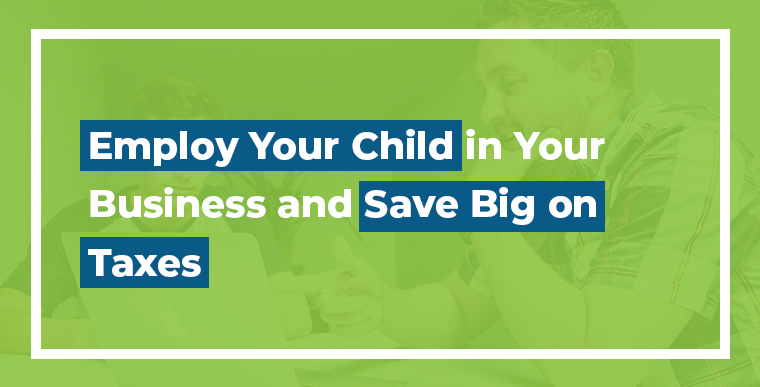
Last week, I wrote an article on The Secret to Raising Financially Successful Children where I highlighted the power of children working and starting their ROTH IRA early.
This week, I wanted to provide insight to my business owner readers on how you can shield income 100% from taxes by hiring your child. If you couple this strategy with last week’s ROTH IRA strategy, you will essentially create permanently tax free business income.
As an employer, when you hire an employee their pay is a business expense. So if you generate $10,000 in revenue from clients and pay an employee $10,000, you have no income.
Additionally, as an employer, there are taxes that need to be paid, specifically 7.65% of your employee’s income for half of their Social Security and Medicare tax, otherwise known as FICA tax. These taxes increase the cost of having the employee on your payroll but are also a business expense.
A self-employed individual, pays self-employment tax of 15.3% which is the same as the employer and employee portion of the FICA tax. This makes it extremely valuable to shield income from this tax. One of the best tax strategies is finding things you pay for already that are really business expenses because every dollar spent through the business will save you 15.3% (plus income taxes of 0 – 41%).
An even better strategy is to employ your child in the business. The first $13,850 of income in 2023 is income tax free due to the standard deduction. So any pay up to that amount becomes non-taxable to you as a business expense and income tax free to them as the standard deduction. Furthermore, a sole-proprietor is exempt from collecting FICA taxes on pay to their children, saving the 15.3% and making this truly tax free income.
One item to note is that if you operate your business as a partnership or corporation, including a subchapter S corporation, you will need to pay FICA taxes. Although this strategy is still very good as it avoids income tax on this money.
To use this strategy, you should note a few things. First, your child needs to actually perform the work including tracking their time in a documented place (i.e., a timesheet). Second, your child needs to be paid a reasonable wage for the work performed. You cannot pay a child $150 per hour to shred paper, but if a clerical office worker gets paid $40 per hour, then you can pay the same to your child for clerical work performed.
Lastly, you cannot employ a child who is too young. Tax law has no minimum age, however, it would be hard to prove that a 2 year old worked productively in your office. The youngest case law we have to rely on is the Eller case. Mr. and Mrs. Eller owned and operated mobile home parks. They hired their 3 children ages 7, 11 and 12. The court ruled that Mr. and Mrs. Eller were able to employ their children even at these young ages. The IRS in its acquiescence (where they agree to apply the findings to any similar case) to the court noted that compensation to children is only deductible if reasonable in amount, actually paid and based on services actually rendered.
So from age 7 and older, you have this previous case to rely on.
If you want personalized, assistance with your unique tax situation, my team can help you get the results you want.


